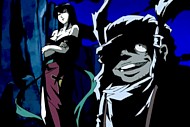
Requiem From The Darkness
I was recently reading a conversation about the dearth of anime horror titles. That doesn't mean that there aren't plenty; it means that few are truly frightening. Certain horror tropes common in American films -- such as the "jump" where the killer (or a black cat) pops out of nowhere or the musical "sting" that surprises you -- are almost never seen in anime. I think Western audiences expect a good horror film to shock them with a gory moment or two, make them crawl out of their skin once, and pop them out of their seats a few times. This kind of horror is experience-oriented; the plot doesn't matter so much as the act of getting the crap scared out of you. It's why so many horror movies get lousy critic scores but make tons of money -- who cares if Freddy Krueger makes sense if you get to overcome a primal fear or two in watching?
Eastern horror is more concerned with the creepy and disturbing. They tend to deal with imagery that lingers with you long after the last reel has flipped through the projector. (It's the same reason why you may never remember a single event from a Friday The 13th movie, but everybody knows that flippin' hockey mask.) And from what I've seen, Eastern horror may use superstition and the supernatural for its basis on occasion, but what's really scary is not that some dead spirit from the next world might come and get you but that people are nasty and evil in this one. Put together a flipshow of freakish icons and otherwise normal people turning into sadists, and you've got a completely different but still satisfying recipe for terror.
Requiem From The Darkness is a 13-episode series from 2003 that specializes in Eastern horror. While there are several recurring leads, it's essentially an anthology series that shows that the roots of ancient tales and legends come from the awful deeds not of otherworldly demons but all-too-real human beings. If you can think of an evil thing humans can do to one another, it probably shows up sooner or later. While the show is more tasteful than it could be, I guess, this is a gruesome ride meant to give adults a few sleepless nights.
As the show begins, we're introduced to Momosuke, a young author who used to write books for children in 19th century Japan. Looking for a new challenge, he's decided to write the Hundred Stories, a collection of all the ghost stories he can find from around the island nation. During his travels, he encounters more than his fair share of brutality as he does his research.
At virtually every stop along the way, he also runs into a strange trio of characters from the underworld called the Ongyo. Mataichi's their leader, a cynical peddler of charms, while the tall Nagamimi hides himself well by disguising himself as others. Last but not least is Ogin, a seductive gal who would be just as comfortable working the red light district as hunting down evildoers. We aren't sure who the Ongyo are, really, only that they are not to be trifled with. Their plans usually end with the death of someone who's done great evil, though they rarely cause that death themselves. Instead, they expose the evil and then commit the wrongdoer to the next world.
Momosuke is at once fascinated and repulsed by the Ongyo, and they take a liking to him, which is why they warn him time and again not to get too involved. He's too kind and naïve to be sucked into in their world. But as he develops a crush on Ogin and takes a more active role in stopping the savagery he's seen, the deeper he swirls in the pool of depravity. Momosuke must figure out whether he is a moral man and what that means in a world of barbarism.
While you may find Requiem From The Darkness too dark and ugly for your liking, you have to respect the artistic choices that make this show stand out. Its mix of traditional anime styles for characters but almost scroll-like art for backgrounds and buildings gives it flair and ramps up the creepiness. Colors are muted with a deep sense of blacks amongst all the other shades. There are flashes of CGI here and there in waves and flames and banners. While these look primitive, they are effective in adding to the atmosphere. Near the end, the artwork suffers from a lack of detail -- I'm assuming that it was a time issue, but you can't help but notice some deficiencies (particularly in episode 11). Those problems aside, the visuals are simply perfect in creating this shadowy world.
Requiem's biggest strength is in its episodic stories. In Twilight Zone fashion, there's typically either a twist or a moral in each of them, and while the savvy will see the surprises coming, they are entertaining. I was often reminded of the recent Mushi-Shi, where a wanderer helped people deal with microscopic, mystical creatures whose abilities led to many legends in the same era in Japan. In contrast to that series, though, everything in the world of Requiem is twisted and malevolent. The first two volumes present the strongest concepts, and while they are unnerving they are not as graphically violent as the show eventually becomes. The first seven episodes or so, I truly enjoyed. I appreciate the show's viewpoint that evil springs far more from the human heart than it does from external monsters.
Unfortunately, the longer the show goes, the more it wears out its welcome. In the second half, I was less intrigued by the stories as I spent my time trying to figure out just what the (more or less literal) hell was going on. The stories don't get more complex; they get unnecessarily confusing. And by the time the ending rolls around as a wicked lord decides to carry out a series of demented tortures, I was about done. The show approached my threshold for depravity. Thankfully, the worst of it (particularly sexual violence) is carried out either off-screen or in shadow. Still, heads roll and viscera flows freely. Perhaps more difficult was dealing with the thematic elements. A number of taboos come up, everything from baby killing to incest. While Requiem is not exploitative in the sense that it finds horror in these concepts rather than titillation, I found myself overwhelmed by the end. Then again, I think that was the point.
While I thought the show was effective enough, I was also disappointed that the relationship between Momosuke and the Ongyo never deepened. These denizens of the netherworld are ciphers; we never learn a thing about who they are -- or once were, perhaps. They remain a mystery at the end. Momosuke's personal journey has some forward motion, but not enough to drive the series, and I wasn't convinced of why Momosuke became obsessed with Ogin. These four misfits play an important role in every episode, yet they are little more than a framing device to bring continuity to a show that doesn't really need it. From what I've read online, there is supposed to be a follow-up to the novel on which this series was based. Maybe that's where we'll learn more about the three amigos of the darkness? I dunno.
I don't want to downplay this series too much; it does what it sets out to do. I can't fault it for being seriously warped; that's what it's supposed to be! I appreciated the fact that evil is punished and condemned. It is visually accomplished at many points. Yet I am disquieted by the whole. If you like horror shows, especially those with blood and guts, this should be a shoo-in for your collection. But if you don't have a taste for the macabre or are easily upset by cruelty or taboo subjects, skip it. All I know is that after Requiem From The Darkness, the only other thing I need to watch this October is It's The Great Pumpkin, Charlie Brown. My horror quotient's full.
Requiem From The Darkness -- graphic violence, nudity, profanity, strong adult situations and concepts (including rape and incest) -- B

